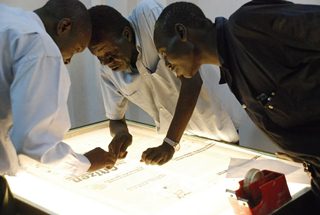Journalists in S. Sudan facing harassment, intimidation: report
July 04, 2012 (JUBA) – Nearly a year since it split from Sudan, the Republic of South Sudan has not made any “significant” improvement in the level of media freedom according to an independent media report.

The report, entitled “World’s youngest country yet to embark on road to civil liberties,” which was unveiled on Tuesday, also highlights the growing tendency of journalists to self-censor, and stresses the need for laws regulating the media.
South Sudan, according to the organisation, is ranked 111th out of 179 countries in the 2011-2012 press freedom index.
“South Sudan is not currently prey to concerted and systematic harassment of its media. But there has been a disturbing accumulation of incidents and isolated acts of repression or intimidation that end up undermining the climate in which journalists and media operate,” according to the report.
From the time it attained self-rule six years ago under the 2005 peace deal, South Sudan still lacks the basic legislation required to regulate media operations in the country. The draft media law remains shelved in the National Legislative Assembly (NLA), while access to information bill remains a illusive.
The report, urges the authorities to severely punish anyone impinging upon freedom of information and to cease the use of nationalism to pressure the media. It specifically appeals to the military and security apparatus to put a stop to “acts of brutality” towards journalists while calling upon the NLA to “quickly” adopt the three media laws that were submitted by the government.
FOREIGN AID RESTRICTION
Reporters Without Borders urges the international community to pre-condition aid to South Sudan, unless the latter shows respect for fundamental freedoms, especially freedom of information.
The organisation, in its report conducted between 9-15 May, further encourages Non-Governmental Organisations (NGOs) to support the development of South Sudan’s media through training, and calls on
journalists to adhere to professional ethics and resist the pressure to censor themselves.
Nhial Bol Aken, the Managing Editor of the Citizen daily newspaper told Sudan Tribune on Wednesday that the report from Reporters Without Borders, accurately reflects the situation regarding press and media freedoms in South Sudan.
“How can you talk of press and media freedoms in South Sudan when the government has not made any progress on the process of democratic transformation? This tendency of dictatorship is what is delaying the passing of the media law,” said Aken, from Nairobi, Kenya.
He also expressed fears that the media bill, currently before lawmakers, could be easily “distorted” to suit what he described as the interests of some people within the current leadership.
“The recent tension between journalists and MPs which emerged after a reporter [Mading Ngor] was assaulted and later expelled from the assembly simply shows why the media bills are still being delayed and could even be altered,” added the Citizen newspaper boss.
A US Department of States report on the human rights situation in South Sudan recently accused the government on failing to respect freedom of speech and the press, as provided for by the country’s transitional constitution.
The report, compiled between January and December 2011, cites government interference in the publication of articles, violence and harassment of journalists, and widespread confiscation or damaging ofjournalists’ cameras and equipment by security forces.
“On November 2, [2011] security forces arrested without charge Ngor Aguot Garang, editor of the English-language daily Destiny [and also Sudan Tribune journalist], following an October 26 article in the newspaper that criticized President Kiir. The newspaper was suspended, and on November 5, Dengdit Ayok, the deputy editor of Destiny and author of the article, was also arrested and suspended from working as a journalist. On November 18, both journalists were released. Garang claimed that he was beaten and tortured while in detention,” according to the US report.
(ST)
